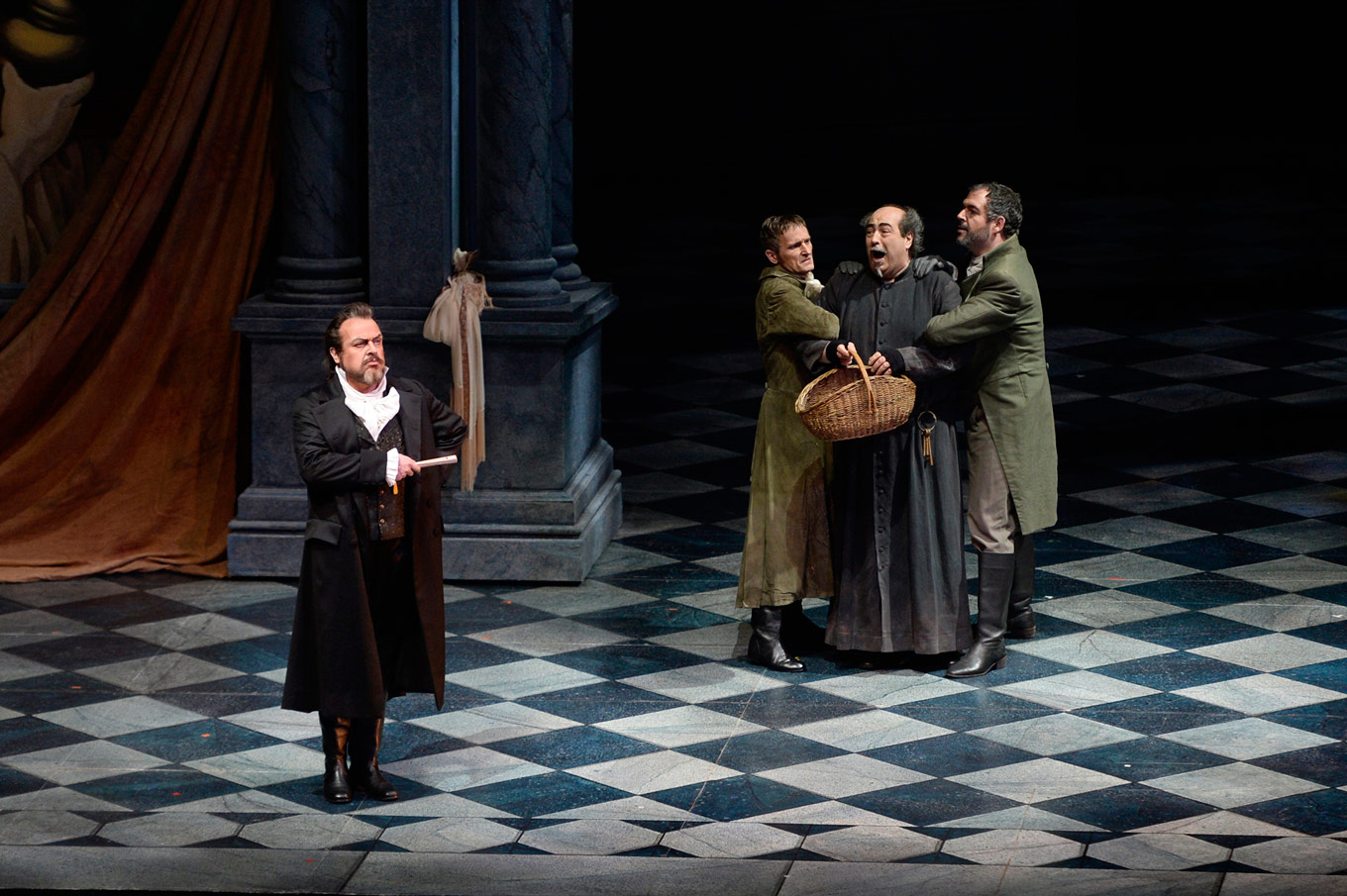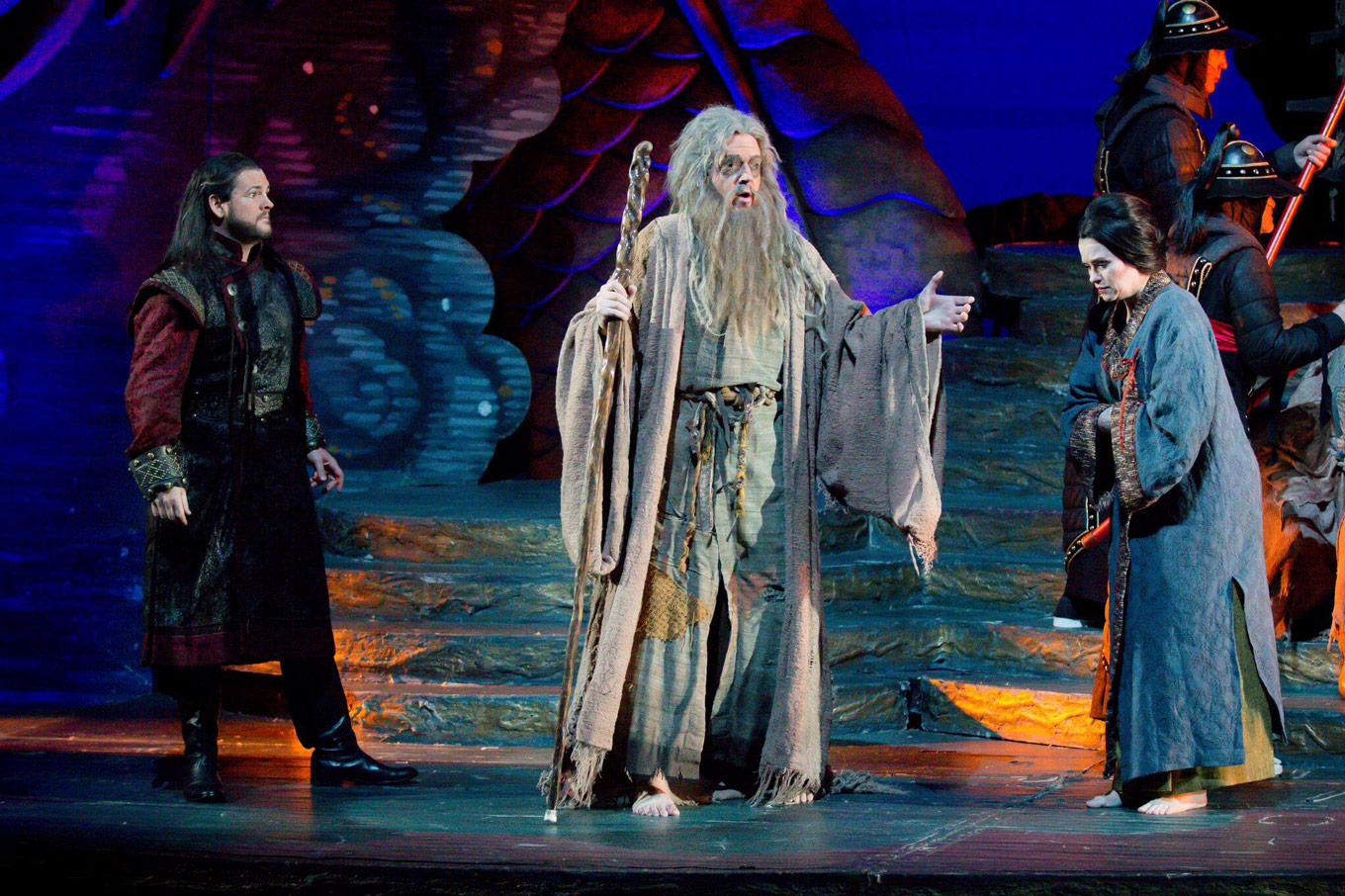
Talking with singers: Giles Tomkins
InterviewCanadian bass-baritone Giles Tomkins has enviable roles like Timur (Turandot), Don Basilio (Il barbiere di Siviglia), and even Gandalf (The Hobbit) on his résumé, and each time he takes the stage, his is a memorable performance. He just wrapped a run of Tosca at the Canadian Opera Company, and he’s already looking forward to being a part of the world premiere of James Rolfe and Morris Panych’s The Overcoat next season.
An articulate guy on top of being a stellar singer, Tomkins chats about the international route to a Canadian career, and all the beautiful ways his life as a new dad has transformed his work onstage.
What’s it like to balance a singing career and a young son? Did you find anything changed about your perspective on singing after becoming a father?
The most challenging thing about being a father and having a singing career is the travelling. Being on the road for sometimes months at a time is tough and can really tug at the heartstrings. But thank goodness for FaceTime! I can check in with my family at least once a day, and even join them for a meal over the phone or computer screen. I can’t even imagine what it would have been like for singers in the past who didn’t have this technology.
Since becoming a father, many things have changed in my life. I am now REQUIRED to have serious time management skills, which I’m discovering are essential to maintain a regular practice routine (as well as general sanity!). This is especially important when working on contemporary opera, which I love to sing! My time in the practice room is now more precious than ever, and I love balancing this time with all the new fatherly routines I have which include playtime, mealtime, story time, bedtime….I could go on!
Being a dad has also included an emotional maturity that frankly took me a little by surprise. As a result, I often feel more dramatically connected to the opera roles I take on, and not just the typical “father figure” parts. This in turn has impacted my singing as it’s all part and parcel of how I produce my sound on the stage. It’s an exciting time, as I feel there are many more opportunities opening up to me.

As a low-voiced male, what’s the best part about playing the bad guy?
The traditional “bad guy” role that all low-voiced male singers get to experience, is one that I relish and look forward to “inhabiting” many more times in my career. As a member of the Glyndebourne chorus of Billy Budd, I was able to literally soak up the venom that Claggart would spew at Billy. I was mesmerized by Brindley Sherratt who completely owned this nasty character. From that point forward, John Claggart has gone to the top of my “dream role” list. Hopefully I can balance the evil with the good, and continue to take on the more sympathetic roles as well, including Timur and Raimondo, both of whom I’ve enjoyed playing in recent seasons (Edmonton Opera/Pacific Opera Victoria).

With your busy schedule, how common is it for you to have singing gigs in your hometown?
As a new dad, I’m continuing to travel wherever the work takes me. However, it is now more than ever a definite bonus to be hired in my hometown of Toronto. I recently made my debut on the Canadian Opera Company stage as Sciarrone in Puccini’s Tosca, which was an absolute dream. Not only did I have an incredible cast and crew to work with, I was able to sing for the company I grew up with. For many years, I would attend performances with my parents who were season ticket holders. The COC instilled in me a life-long love of opera. I hope that there will be many more opportunities to perform there.

One of the highlights of my next season is the chance to be a part of the world premiere of a new opera The Overcoat, by composer James Rolfe and librettist/director Morris Panych. This is a co-production between Tapestry Opera, CanStage, and Vancouver Opera. I’m incredibly excited to continue to work on this, as I’ve been involved in several development workshops already. This show presents another opportunity to work at home for me, before travelling to Vancouver immediately after to be a part of the Vancouver Opera Festival. After the buzz and excitement surrounding the first festival there this spring, I can’t wait to experience it firsthand next season!

What do you think of the Canadian concept of “building your career elsewhere in order to become in-demand in Canada”?
There is a sense that as a young singer, one has to leave Canada and have success elsewhere before becoming “in demand” at home. I think this is still mostly true. There are many opportunities overseas to get work and hone your craft, both as a member of a program, or as a young professional. I was fortunate to have some amazing opportunities in the UK as a young singer in my twenties, including roles in the Aldeburgh Festival, several role debuts with Scottish Opera, and two seasons as a member of the Glyndebourne chorus.
I know many of my friends and colleagues have gone to Germany, Denmark, and Austria among others to embark on careers. There is definitely an advantage to having these companies and roles on your resume when presenting yourself to audition panels back home. In my thirties, I’ve been very fortunate to sing with most of the regional companies in Canada, and I’ve no doubt that my experience gained overseas has helped me develop as an artist.
At the end of the day, there are many roads that can lead to a career in opera. None of these routes are quick. It’s a lot of hard work, and keeping an open mind and a good attitude can lead to an “open door” and I think you just have to be ready to walk through with your best foot forward, whether it’s here at home or in another country.

Why do you sing professionally?
I sing professionally because I can’t imagine doing anything else. I never take for granted the opportunity to take the stage and perform for five or five thousand people. Music has the power to heal and change lives. In these troubled times, it’s now more important than ever to continue to contribute to this wonderful and timeless art form.


Comments